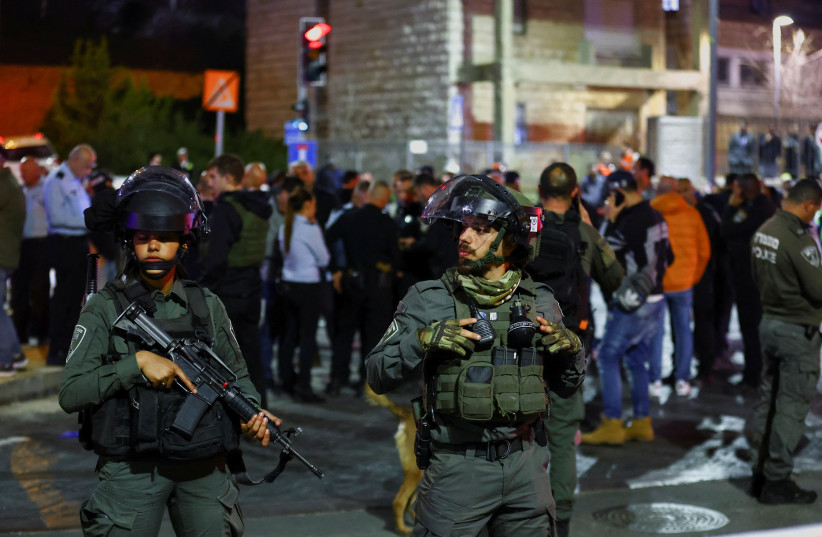For Palestinians, terrorism against Israel pays - opinion

In what they describe as social security payments, the PA hands out monthly rewards to Palestinians (and their families) who carry out terror attacks against Israeli civilians and soldiers.
Years ago, I sat in a conference room with Ashraf al-Ajrami, who served as the minister of Prisoners Affairs for the Palestinian Authority (PA). Ajrami, I was told, was a moderate Palestinian politician whose goal was to push for a way that Israelis and Palestinians could coexist. Ajrami addressed a room of journalists and explained how, to him, the only real push to end Israel’s military occupation was coming from the Israeli Left and from NGOs like B’tselem (who have presented inaccurate information in the past).
I raised my hand and said, “Mr. Ajrami, I don’t consider myself a left-wing Israeli and I take many issues with some of the NGOs you’ve mentioned but I believe that the Palestinians have a right to statehood and I know that the only way forward is a two-state solution.” I then continued, “what scares me is that the PA’s glorification of terrorism and stipends you pay to terrorists who have murdered Israelis.”
Hoping I could have an honest conversation with a moderate Palestinian politician, I asked, “How can I be expected to fight for peace when my neighbors pay off the people who want to kill me?”
Ajrami looked at me and responded, “This is our form of social security. When Palestinians go to jail or are killed, we must ensure their family is taken care of.”
Yes, for Palestinians, terrorism pays.
The family members of Khairy Alkam, the Palestinian who murdered seven Israelis outside the Ateret Avraham synagogue in Neveh Ya’acov, should have, according to Palestinian Authority policy, already received an advance of $1,700 (NIS 5,896) as part of a monthly stipend.
In what they describe as social security payments, the PA hands out monthly rewards to Palestinians (and their families) who carry out terror attacks against Israeli civilians and soldiers.
Fatah established the Palestinian Mujahidin and Martyr’s Fund in 1964, to support widows and orphans of Palestinian fedayeen (freedom fighters, militants or guerrillas). In 1971, it was replaced by the Society for the Care of Palestinian Martyrs and Prisoners to include any military martyrs who have died of natural causes while on active service. It also meant that any average Palestinian killed during any encounter with Israeli security forces was given a one-time payment.
Palestinian law mandates that 7% of the annual PA budget be allocated to the Martyrs Fund (or pay-for-slay), designed to incentivize Palestinians to choose the path of terrorism. The PA spends more money on pay-for-slay stipends than on Palestinian Healthcare and a terrorist released from prison receives lifelong economic and employment security.
THE ISRAEL Defense And Security Forum has reported that the PA’s pay-for-slay policy makes it five times more profitable to become a convicted terrorist than a teacher. They also noted that the income a Palestinian terrorist who serves a life sentence in prison receives is a salary that is four times higher than the average Palestinian income and eight times higher than the Palestinian minimum wage.
The pay-for-slay payments became routine during the Second Intifada (2000–2005) when Palestinians hit Israel with a wave of terror attacks that included suicide bombings, gunfire, stone-throwing and rocket attacks. In 2016, the PA spent about $303 million (NIS 1 billion) on pay-for-slay stipends, distributed to 35,000 families, including the families of suicide bombers.
The international community has tried to pressure the PA to stop these terror stipends (Taylor Force Act, 2018), but PA President Mahmoud Abbas has a history of ignoring global demands and instead, has increased the amount allotted to these stipends. Israeli NGO Palestinian Media Watch reported that the PA spent no less than $271 m. (NIS 939m.) paying terrorists stipends in 2021. About $193m. (NIS 669m.) was spent on terrorists in prisons and released terrorists, and another $78m. (NIS 270m.), at least, were paid to wounded terrorists and the families of dead terrorists.
Indeed, the PA has no intention of stopping these pay-for-slay stipends. In a recent interview with i24news, Jenin’s Mayor Akram Rajoub stated, “the Palestinian Authority will not stop funding the families of our martyrs even if we are down to the last penny.” Rajoub added, “Every move Israel takes against the prisoners will be met with our response. If Israel pushes us to extremes, it will come back to haunt it.”
After discovering where the pay-for-slay money goes, several countries, including the United States, the Netherlands, Australia and Germany, have cut direct payments to the PA. However, just this week, the European Union announced that it has decided to increase funding to the PA to the tune of €296m. (NIS 1.1b.). This is blood money that will inevitably go toward the pockets of terrorists and their families.
Every time a terrorist murders Israelis, we repeatedly see celebrations erupt in Gaza and the West Bank. This should come as no surprise when a society financially rewards violence and indoctrinates their children in schools to become Martyrs.
Whatever your opinion is about the Israeli-Palestinian conflict, anyone with a rational mind can understand this: a society that financially incentivizes and glorifies terrorism is not interested in peace or any resolution to the conflict.
The writer is a social media activist with over 10 years of experience working for Israeli, Jewish and cause-based NGOs. She is the co-founder and the COO of Social Lite Creative, a digital marketing firm specializing in geopolitics.
Jerusalem Post Store
`; document.getElementById("linkPremium").innerHTML = cont; var divWithLink = document.getElementById("premium-link"); if (divWithLink !== null && divWithLink !== 'undefined') { divWithLink.style.border = "solid 1px #cb0f3e"; divWithLink.style.textAlign = "center"; divWithLink.style.marginBottom = "15px"; divWithLink.style.marginTop = "15px"; divWithLink.style.width = "100%"; divWithLink.style.backgroundColor = "#122952"; divWithLink.style.color = "#ffffff"; divWithLink.style.lineHeight = "1.5"; } } (function (v, i) { });

